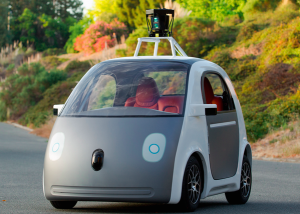This is a practice lesson for TFNG questions in IELTS reading.
Google’s Self Driving Car
Google has finally built its own car from scratch. And it looks similar to a gondola with wheels. The two-seater prototype vehicle is Google’s idea of what the modern automobile should look and feel like if you took the human out of the transportation equation and designed something solely to chauffeur passengers from point A to B.
The car — which was conceived and designed by Google, unlike the ones it previously modified — lacks many of the trappings of a normal car, and that includes three of the most essential parts. It has no steering wheel, no accelerator pedal and no brake pedal. The company that designed the world’s simplest home page also decided to lose the mirrors, the backseat, the glove compartment and the stereo. What’s left are lots of sensors, and a transplant of the self-driving software system Google has built to use on the Toyota Priuses and Lexus SUVs it has trained to drive on highways and city streets over the past five years.
Passage from recode.net
Questions 1-3
Decide if the statements below are true, false or not given according to the information in the passage above.
- The Italian gondola was used as a design model for the new car.
- The new car is aimed at transporting passengers from one place to another using a chauffeur.
- The new car has more features than the modern car.
Answers
Click below to reveal the answers
Answers- Not Given
- There is no mention of what Google used as a design model. It does mention that it likes like a gondola but not that this was a design model. So, the answer is NG.
- False
- The answer comes from “designed something solely to chauffeur passengers from point A to B“. The questions says “The new car is aimed at transporting passengers from one place to another…” this part of the sentence is the same as the passage. The word “chauffer” in the passage is a verb = to transport. So, this part of the sentence is correct.
- However, the second part of the question sentence “using a chauffer” is wrong. In the question statement, the word “chauffeur” is a noun and it means a person who is paid to drive the car. The passage clearly contradicts this because the new car has no human driver. Therefore the answer is FALSE.
- This question is really testing your vocabulary. Do you know the difference between “chauffer” and “chauffeur” = one is a verb = transport / one is a noun = a person who is a paid driver
- A false answer means that part of the question statement is contradicted in the passage. The passage shows that it the statement is written incorrectly.
- NG
- The passage says that the new car doesn’t have many of the features of the modern car – steering wheel, mirror etc. The passage also says that the new car has many new features such as a lot of new sensors and new software. But the passage does not compare the number of features. The passage does not clearly state that the new car has more features than the modern car. There is plenty of information about the features but no clear comparison of the number of features. This means the answer is NG
- Always look out for comparison statements in TFNG questions.
More Reading Practice for IELTS
You can find more reading practice and tips on the main reading page: IELTS Reading Lessons & Tips
If you want to learn IELTS writing task 2 or speaking etc, just visit the main pages of this website through the red bar at the top of each page.





